Since my computer died, which – I swear to God – will have been my last PC, I’ve had several opportunities to trundle up to the Grand Apple store in Grand Central.
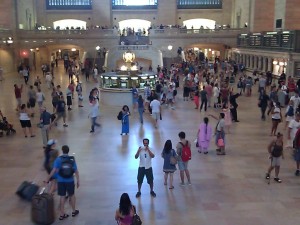 Every time I climb up the steps, I turn around and pause to look at the masses of people down below. That said, “masses” is not the right word at all. Mass, singular, isn’t correct either. Even on a busy day, the many people are clustered in different formations. They are either standing still in a line, as in front of the various ticketing stalls, or they are in smaller groups around the central clock. Some are waiting to meet up, some are simply standing in the middle of the hall, looking up at the magnificent ceiling, hopelessly snapping pictures with their phones at the beauty up high, or they stare frowning into maps or books or phones. Around these smaller configurations you have the milling crowd: streams coming in and going out from all sides, from above and below, the dining concourse.
Every time I climb up the steps, I turn around and pause to look at the masses of people down below. That said, “masses” is not the right word at all. Mass, singular, isn’t correct either. Even on a busy day, the many people are clustered in different formations. They are either standing still in a line, as in front of the various ticketing stalls, or they are in smaller groups around the central clock. Some are waiting to meet up, some are simply standing in the middle of the hall, looking up at the magnificent ceiling, hopelessly snapping pictures with their phones at the beauty up high, or they stare frowning into maps or books or phones. Around these smaller configurations you have the milling crowd: streams coming in and going out from all sides, from above and below, the dining concourse.
I watched this going on for some time, etching the dynamic into my mind for the next time I have to stage a complex crowd scene. I’ll need at least four subsets of different movement or standing patterns to make it look convincing, aka “real”. That was a revelation.
We tend to think in binary terms: people are either singular, individual, and have one mindset – also politically speaking -, and then we have the mass, which behaves in a completely different way. But unless there is a strong galvanizing force, say an emergency, or in a more benevolent case a theatrical event, out of a large number of people, we need to “create” a unity out of little groups. From the problem of creating on stage a convincing crowd, a logical next question for the theatre person is how to create a unified crowd out of disparate groups in the audience. What galvanizes viewers into becoming one? A charismatic performance, a compelling story line, a striking visual? All these elements contribute to this, and as theatre makers we strive to make them all as arresting as possible for the attention to be focalized, but when it happens, it always feels like magic.
Are there tricks? Well, the savvy director/producer knows that if you have a small house you seat them together, as closeness enables the forming of a “company”. You try to generate an audience “ensemble” as much as you want to create that quality in your cast. A big aspect of the rehearsal process involves “creating an ensemble”, a trusting group of performers, who can play together, even if their characters rip each other to shreds. That same energy is desired in the audience.
As we seem to move apart as a society, I see more and more shows that immerse their audience in an experience – Sleep no more as a case in point- , or have the actors engage with the audience before the show, during intermission, eating and drinking together – The Seven Sicknesses – or even the experience people have who buy tickets for Wagner’s Ring Cycle at the Bayreuth festival in Germany. You can’t get tickets for each individual opera, you have to commit to the whole four-evening endeavor. And every night you have the same seat, and every night, therefore, you have the same neighbors. I’ve witnessed it over and over during my four years working there that people will inevitably connect. By the time the gods go down in Götterdämmerung, friendships (and hostilities) have formed in the audience, the production has been dissected between them while everybody has endured the same hard seats (acoustics be damned!), and you experience something like the origins of theatre, sprung from religious ritual in Greece. Community. But community not as a starting point, but as an end point, an achievement of unity out of disparate elements. Like that crowd in Grand Central, which in small groups have their own agendas and stories. It’s an effort to come together, and not always pretty, be it in rehearsals, in the theatre with a sweaty neighbor, or in conflicts mundane and/or political. But it’s worth the effort, for when community happens, it’s a wonder, it’s communion.









 … I landed in New York City on an artist’s grant from the state of Liechtenstein. Pretty bad timing, since in 2002, one year after 9/11, the rest of the world was hightailing it out of here. Ouch. When I had applied for this particular grant, which allows working Liechtenstein artists to be sponsored for one year at a location of their choosing, as long as they make a convincing enough case for its ability to provide artistic growth, 9/11 had not happened yet, and nobody saw such a sea change coming to this town.
… I landed in New York City on an artist’s grant from the state of Liechtenstein. Pretty bad timing, since in 2002, one year after 9/11, the rest of the world was hightailing it out of here. Ouch. When I had applied for this particular grant, which allows working Liechtenstein artists to be sponsored for one year at a location of their choosing, as long as they make a convincing enough case for its ability to provide artistic growth, 9/11 had not happened yet, and nobody saw such a sea change coming to this town.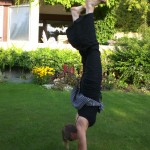
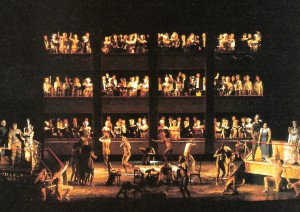
 The other side of the coin was that I am half American and half Liechtensteiner, but apart from family visits to Kansas and camp experiences, I had never actually lived in the US. I was at that point unencumbered by house or kids, and it felt like the last moment to reinvent my world. I’d fallen in love with NYC back in the 80s, pre-Giuliani, and living here, had since then been a dream. Time to make it happen.
The other side of the coin was that I am half American and half Liechtensteiner, but apart from family visits to Kansas and camp experiences, I had never actually lived in the US. I was at that point unencumbered by house or kids, and it felt like the last moment to reinvent my world. I’d fallen in love with NYC back in the 80s, pre-Giuliani, and living here, had since then been a dream. Time to make it happen.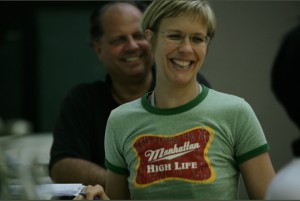 But, for better or for worse, I’m here now. It was not a career decision and I was happy with my Frankfurt boyfriend. It was rather a simple continuation of a back-and-forth that I’d established over the course of that one year. Every 2 months I’d be back in Europe, and pretty much remained mid-atlantic in feeling. And when Sept 5, 2003 came around, I wasn’t nearly finished with New York. Not done with me in New York. Not done with the New Yorkers. Or with the boroughs. And no, it wasn’t a great gig, or a new man. I just wasn’t done. And the funny thing is, 10 years later, I’m still not. My life’s roots are in Liechtenstein, my professional ones lie Frankfurt, but I am now at home in New York. Not the whole of the USA, mind you, but this particular city, with its unique energy and neurotic, ambitious, caustic, no-bullshit, generous, warm inhabitants. A familiar terrain with so much still to explore. I guess I’m a lifer. A toast!
But, for better or for worse, I’m here now. It was not a career decision and I was happy with my Frankfurt boyfriend. It was rather a simple continuation of a back-and-forth that I’d established over the course of that one year. Every 2 months I’d be back in Europe, and pretty much remained mid-atlantic in feeling. And when Sept 5, 2003 came around, I wasn’t nearly finished with New York. Not done with me in New York. Not done with the New Yorkers. Or with the boroughs. And no, it wasn’t a great gig, or a new man. I just wasn’t done. And the funny thing is, 10 years later, I’m still not. My life’s roots are in Liechtenstein, my professional ones lie Frankfurt, but I am now at home in New York. Not the whole of the USA, mind you, but this particular city, with its unique energy and neurotic, ambitious, caustic, no-bullshit, generous, warm inhabitants. A familiar terrain with so much still to explore. I guess I’m a lifer. A toast!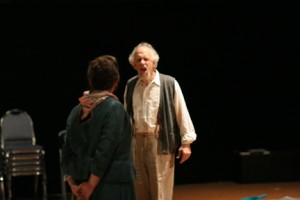 What’s the fallout? Well, we got a lot of publicity, consistent audiences, reviews ranging from good to middling to very very strange, but then a talk-back session with audience responses that blew me away with their level of questions and insight. So go figure. Of course it’s still much too close for me to really make an accurate assessment of what it all means. So much work, passion, conviction, not only for me, but for everyone in the team. If I don’t have it, how can I expect anyone else to give themselves fully?
What’s the fallout? Well, we got a lot of publicity, consistent audiences, reviews ranging from good to middling to very very strange, but then a talk-back session with audience responses that blew me away with their level of questions and insight. So go figure. Of course it’s still much too close for me to really make an accurate assessment of what it all means. So much work, passion, conviction, not only for me, but for everyone in the team. If I don’t have it, how can I expect anyone else to give themselves fully?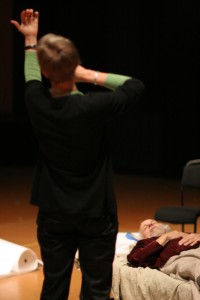 Which brings me to a more general subject: where does the inspirator inspire herself when the going gets rough? The obvious choice are loved-ones, friends and drink. Yes, that all works, though in a strange city, with one’s beloved a continent away, and drowning oneself in drink is not a good idea long-term, this really is an issue. Often it’s not even so much about serious problems, but the general venting and lamenting, that we need to get out of our systems, so we can function for another day. Yes, yoga helps, yes, running helps. And in my case I found time and time again, that going into the Elliott Bay Bookstore, and browsing through books, relieved my mind from my individual trials and tribulations, as I let myself be carried into an imaginary world, or a subject matter I didn’t even know existed. Naturally this leads to buying too many books, which I certainly did bemoan the other day, when it came to packing them. However, there is a solace in the life of the mind, and I really don’t mean that in any uppity way. Just as a momentary escape hatch, when one’s system is overloaded, there is no one to talk to, and my ambition is not to end my days going to AA for the rest of my life.
Which brings me to a more general subject: where does the inspirator inspire herself when the going gets rough? The obvious choice are loved-ones, friends and drink. Yes, that all works, though in a strange city, with one’s beloved a continent away, and drowning oneself in drink is not a good idea long-term, this really is an issue. Often it’s not even so much about serious problems, but the general venting and lamenting, that we need to get out of our systems, so we can function for another day. Yes, yoga helps, yes, running helps. And in my case I found time and time again, that going into the Elliott Bay Bookstore, and browsing through books, relieved my mind from my individual trials and tribulations, as I let myself be carried into an imaginary world, or a subject matter I didn’t even know existed. Naturally this leads to buying too many books, which I certainly did bemoan the other day, when it came to packing them. However, there is a solace in the life of the mind, and I really don’t mean that in any uppity way. Just as a momentary escape hatch, when one’s system is overloaded, there is no one to talk to, and my ambition is not to end my days going to AA for the rest of my life.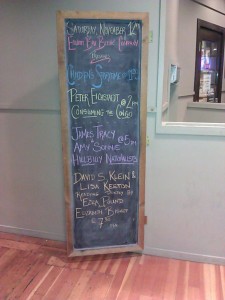
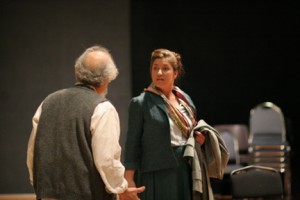
 Ok, we have our first review, and it’s positive. That’s good, and honestly, I don’t care that the lady never mentions my name. She calls the director “expert” and “intelligent”, likes the actors and our green set. Misha Berson from the Seattle Times gives us wonderful placement in an article about theater to see that’s not holiday-themed.
Ok, we have our first review, and it’s positive. That’s good, and honestly, I don’t care that the lady never mentions my name. She calls the director “expert” and “intelligent”, likes the actors and our green set. Misha Berson from the Seattle Times gives us wonderful placement in an article about theater to see that’s not holiday-themed. “What thou lovest well remains,
“What thou lovest well remains,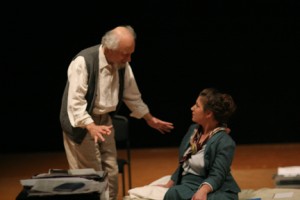 Somehow there’s comfort to be found in the fact if you’ve gotten thru your play once on its feet. Still pretty hobbly, and lots of stuff to be sorted, but it’s like the first time you’ve cut thru the jungle with your machete. I try not to do it too quickly, lest you make a wrong path, but there’s still a moment of relief once it’s done.
Somehow there’s comfort to be found in the fact if you’ve gotten thru your play once on its feet. Still pretty hobbly, and lots of stuff to be sorted, but it’s like the first time you’ve cut thru the jungle with your machete. I try not to do it too quickly, lest you make a wrong path, but there’s still a moment of relief once it’s done.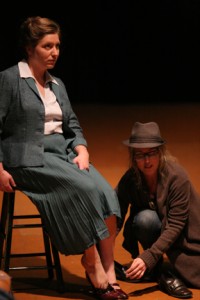 We also had our publicity shooting this week. Karen, our costumer, did her best to get a first take on our costumes ready for that night, and we ran two scenes for Randy’s friend Jim, the photographer. Since one producer told me I should absolutely make sure that there were pictures also of the actors with me the “in charge” director and producer, to build my brand, I put my self into a green top, popped in my contacts and added some lipstick. Then I told the photographer that I’d need something like that too.
We also had our publicity shooting this week. Karen, our costumer, did her best to get a first take on our costumes ready for that night, and we ran two scenes for Randy’s friend Jim, the photographer. Since one producer told me I should absolutely make sure that there were pictures also of the actors with me the “in charge” director and producer, to build my brand, I put my self into a green top, popped in my contacts and added some lipstick. Then I told the photographer that I’d need something like that too.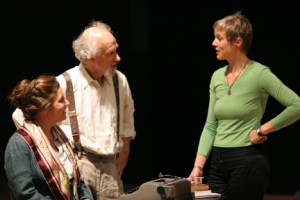 I’m not terribly photogenic at the best of times, and it takes about a zillion shots of me, and a lot of “feel good” time to get me to a picture that is worth something. That evening wasn’t it. However, while I was standing next to David and Lisa, awkwardly clutching my notepad, deciding where to focus, David started talking to me. “I know this is really difficult, but let me ask you this…” and talked to me about something completely different. It worked. Out of the bunch there is one picture that I can really use for that particular purpose. I was very moved at the empathy. Most people don’t readily tap into the fact that I’m actually a bit squeamish when it comes to attention of that ilk. Yes, I can stand in front of a crowd and talk – dealing with choruses will teach you that – but when it comes to myself, I find that really hard. So, thank you, David. Now back to your narcissistic Ezra Pound persona!
I’m not terribly photogenic at the best of times, and it takes about a zillion shots of me, and a lot of “feel good” time to get me to a picture that is worth something. That evening wasn’t it. However, while I was standing next to David and Lisa, awkwardly clutching my notepad, deciding where to focus, David started talking to me. “I know this is really difficult, but let me ask you this…” and talked to me about something completely different. It worked. Out of the bunch there is one picture that I can really use for that particular purpose. I was very moved at the empathy. Most people don’t readily tap into the fact that I’m actually a bit squeamish when it comes to attention of that ilk. Yes, I can stand in front of a crowd and talk – dealing with choruses will teach you that – but when it comes to myself, I find that really hard. So, thank you, David. Now back to your narcissistic Ezra Pound persona! Here I am finally in Seattle, to produce and direct Hayley Heaton’s
Here I am finally in Seattle, to produce and direct Hayley Heaton’s 

